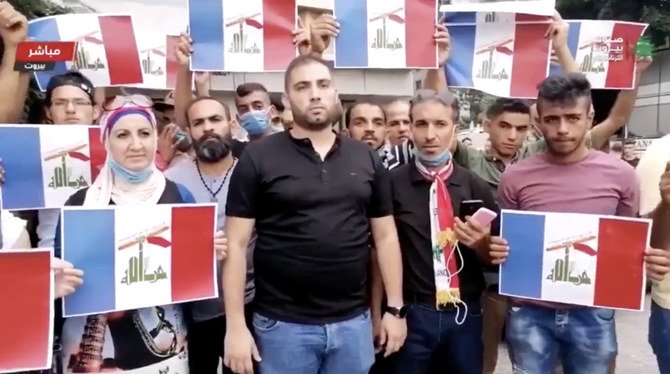
- ARAB NEWS
- 19 Apr 2024

Mainly due to a track record of moderate and consistent positions, and a deeply rooted conviction that all differences can be debated and force used only as a last resort, French foreign policy has always been largely respected across the Arab world — and Emmanuel Macron is no exception to that.
Nevertheless, while the French president must be praised for his genuine concern and rapid decision to come to Lebanon’s aid in its darkest hour, I fear some of the advice he has been given may be demonstrating the accuracy of a common definition of insanity: Doing the same thing over and over again and expecting a different result.
I refer of course to Macron’s remarks during his visit to Lebanon in relation to the Iran-backed Hezbollah group.
Hezbollah “represents a part of the Lebanese people and is an elected party,” Macron told the US news site Politico. (Surely a Frenchman, of all people, should need no reminder that Adolf Hitler’s Nazis were “a part of the German people” and an elected political party.)
On Hezbollah, Macron said: “Today there is a partnership between it and several other parties, and if we don’t want Lebanon to descend into a model in which terror would prevail at the expense of other matters, we have to educate Hezbollah and other parties about their responsibilities.”
Really, Mr. President? How on earth do you propose to educate a party that you yourself concede has an armed, terrorist wing as well as a political one?
That would be the equivalent of asking a schoolteacher to discipline a misbehaving student who came to class with a loaded gun. Such illogical statements and positions, including French support of the Iran nuclear deal, lead one to wonder whether Macron’s own Middle East advisers are the ones who need to be educated on the region’s history and realities.
As the Lebanese politician Nadim Gemayel put it on Twitter: Would you accept, Mr President, that a French party takes up arms and interferes militarily in a European country, or declares war on countries that are allies of France?
No one tried harder than the late Rafik Hariri to engage and absorb Hezbollah. His “reward” was to be assassinated by a man determined by the Special Tribunal for Lebanon to be a leading figure in the “terrorist wing” of Hezbollah — the same people who took Beirut by force in 2008 when their “political wing” failed to do so democratically.
“Don’t ask France to come wage war against a Lebanese political force … it would be absurd and crazy,” Macron said. And of course, he is right; no one expects France — or anyone else — to put boots on the ground, or wage a war it cannot win without further devastating a country already on the brink of collapse.
Rather, what ordinary Lebanese want, what they have been demanding since last October, is an overhaul of the whole political system. This means “out with the old,” including Nabih Berri, parliamentary Speaker since 1992; President Michel Aoun, a former war lord who allied himself with Hezbollah to obtain his position and in doing so has severely damaged the unity of Lebanese Christians, threatening those few who have not already fled the country; and above all, Hezbollah themselves.
There can be no doubt that Macron has made great efforts and has the best of intentions, but his remarks have left many Lebanese, and believers in French diplomacy, with a bitter taste in the mouth.
Faisal J. Abbas
There can be no doubt that Macron has made great efforts and has the best of intentions, but his remarks have left many Lebanese, and believers in French diplomacy, with a bitter taste in the mouth.
At his concluding press conference, he described himself as a pragmatist. Fair enough; if replacing the entire current political class is unrealistic, the very least he could have done was to publicly demand that Hezbollah lay down their weapons and dissolve their terrorist wing. But to expect the Lebanese to believe a pledge given to Macron by any politician while Hezbollah still has the upper (and armed) hand is naive.
Macron should have also refused to enter the Presidential Palace in Baabda unless President Michel Aoun backtracks on his undemocratic decision to ban local channel MTV as a result of its critical coverage of his handling of the country’s crisis.
As for the guarantees Macron gave, he seems to think that withholding the donations pladged to Lebanon at the Paris conference in 2018 would be enough of a deterrent. Of course, the problem with this is that it would be a punishment of the Lebanese people, as opposed to their corrupt politicians.
Macron did speak of possible sanctions of political leaders if they don’t fall into line, but, it was too little, too late. If I were advising the French president, I would have made this particular statement the main talking point if he is to concede that there is no other way to deal with the current leaders.
The French president would have had a completely different reception if he had shown that he meant business, possibly by demonstrating what could be done in terms of sanctions and asset freezes. This would have boosted confidence among the average Lebanese, who have had enough of seeing the rich and powerful escape punishment over and over again.
Critics of a resolute and determined approach will argue that it is not the way to persuade political leaders to come to the table. The powerful counter-argument is that, so far, President Macron’s approach has been well-equipped with carrots … but woefully short of a stick.
• Faisal J. Abbas is the editor in chief of Arab News
Twitter: @FaisalJAbbas